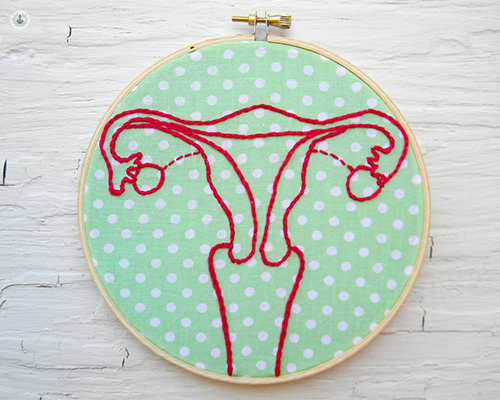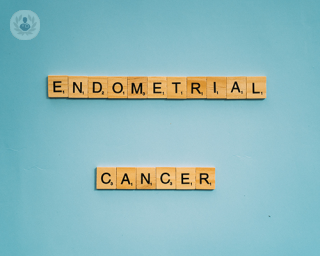What is endometrial cancer?
Endometrial cancer begins in the layer of the cells that form the lining of the uterus, which is the organ where foetal development (reproduction) occurs. It is sometimes known as uterine cancer. Endometrial cancer is usually detected early because it produces abnormal vaginal bleeding.
Currently, the exact cause is not known but it may be related to increased levels of oestrogen. If detected in the early stages, the removal of the uterus often cures the disease.

What are the symptoms of endometrial cancer?
The symptoms present in endometrial cancer are abnormal vaginal bleeding after menopause, lower abdominal pain or cramping in the pelvis, and white vaginal discharge.
What are the risk factors for endometrial cancer?
As it is not clear what causes endometrial cancer, there are certain risk factors that can increase the chances of developing it. These include:
- High levels of the hormone oestrogen, which can be caused by obesity
- Never having been pregnant
- Older age
- Hormone therapy for breast cancer
- Having started menstruation at an early age
How can endometrial cancer be prevented?
The risks of endometrial cancer can be reduced if you keep your body weight in a normal healthy range, discuss the risk of hormone replacement therapy (HRT) after menopause with your doctor, and consider taking birth control pills.
How is endometrial cancer treated?
Endometrial cancer is most commonly treated with removal of the womb (hysterectomy). In the early stages of the disease, the procedure can cure womb cancer, however, it means that you will not be able to get pregnant in the future. Radiotherapy and chemotherapy are also given too.
For women who are younger and who would still like to have children, a type of hormone therapy (progestogen) is an option, which lowers the hormone levels in the body.
Endometrial cancer
Mr Rahul Nath - Obstetrics & gynaecology
Created on: 09-21-2015
Updated on: 07-27-2023
Edited by: Conor Lynch
What is endometrial cancer?
Endometrial cancer begins in the layer of the cells that form the lining of the uterus, which is the organ where foetal development (reproduction) occurs. It is sometimes known as uterine cancer. Endometrial cancer is usually detected early because it produces abnormal vaginal bleeding.
Currently, the exact cause is not known but it may be related to increased levels of oestrogen. If detected in the early stages, the removal of the uterus often cures the disease.

What are the symptoms of endometrial cancer?
The symptoms present in endometrial cancer are abnormal vaginal bleeding after menopause, lower abdominal pain or cramping in the pelvis, and white vaginal discharge.
What are the risk factors for endometrial cancer?
As it is not clear what causes endometrial cancer, there are certain risk factors that can increase the chances of developing it. These include:
- High levels of the hormone oestrogen, which can be caused by obesity
- Never having been pregnant
- Older age
- Hormone therapy for breast cancer
- Having started menstruation at an early age
How can endometrial cancer be prevented?
The risks of endometrial cancer can be reduced if you keep your body weight in a normal healthy range, discuss the risk of hormone replacement therapy (HRT) after menopause with your doctor, and consider taking birth control pills.
How is endometrial cancer treated?
Endometrial cancer is most commonly treated with removal of the womb (hysterectomy). In the early stages of the disease, the procedure can cure womb cancer, however, it means that you will not be able to get pregnant in the future. Radiotherapy and chemotherapy are also given too.
For women who are younger and who would still like to have children, a type of hormone therapy (progestogen) is an option, which lowers the hormone levels in the body.


A comprehensive overview of endometrial hyperplasia
By Mr Osama Naji
2025-01-05
In this article, find out what endometrial hyperplasia is, and what the related symptoms and causes are, as esteemed consultant gynaecologist, Mr Osama Naji, provides us with an all-you-need-to-know guide. See more


Endometrial cancer: advanced stages and targeted treatment
By Professor Susana Banerjee
2025-01-03
Endometrial cancer, also known as uterine or womb cancer, is a cancer of the uterus that is formed by abnormal cell growth inside the tissue of the womb, called the endometrium. In its later stages, it can be difficult to treat, but targeted therapies may be able to provide new hope for patients in their fight against the cancer. In this article, a leading medical oncologist explains the stages of endometrial cancer and how targeted treatment can be used against it. See more


Ask an expert: What are the symptoms of endometrial cancer?
By Dr Natalia Povolotskaya
2024-12-28
In the UK, more than 9,000 people are diagnosed each year with endometrial cancer of the reproductive system. Here, Dr Natalia Povolotskaya, leading consultant gynaecologist and cancer surgeon, provides an expert insight into endometrial cancer, including risk factors, symptoms, and treatment. See more
Experts in Endometrial cancer
-
Mr Rahul Nath
Obstetrics & gynaecologyExpert in:
- Robotic surgery
- Abnormal smear test
- Cervical cancer
- Endometrial cancer
- Human papillomavirus (HPV)
- Ovarian cancer
-
Professor Susana Banerjee
Medical oncologyExpert in:
- Ovarian cancer
- Endometrial cancer
- Cervical cancer
- Gynaecological cancer
- BRCA gene
- Clinical trials
-
Dr Angela George
Medical oncologyExpert in:
- Ovarian cancer
- Endometrial cancer
- Chemotherapy
- Immunotherapy
- Genetics of cancer
- Genetic counselling
-
Miss Nahid Gul
Obstetrics & gynaecologyExpert in:
- Endometrial cancer
- Endometriosis
- Pelvic pain
- Robotic surgery
- Pelvic floor reconstructive surgery
- Colposcopy
-
Mr Auos Al-Dujaily
Obstetrics & gynaecologyExpert in:
- Pelvic pain
- Menstrual disorders
- Ovarian cancer
- Endometrial cancer
- Ovarian cyst
- Menopause
- See all

The Wellington Hospital - part of HCA Healthcare
The Wellington Hospital - part of HCA Healthcare
Wellington Hospital South Bldg, 8A Wellington Pl, NW8 9LE
No existe teléfono en el centro.
By using the telephone number provided by TOP DOCTORS, you automatically agree to let us use your phone number for statistical and commercial purposes. For further information, read our Privacy Policy
Top Doctors

Platinum Medical Centre (HCA)
Platinum Medical Centre (HCA)
15-17 Lodge Road, NW8 7JA
No existe teléfono en el centro.
By using the telephone number provided by TOP DOCTORS, you automatically agree to let us use your phone number for statistical and commercial purposes. For further information, read our Privacy Policy
Top Doctors

The Park Hospital - part of Circle Health Group
The Park Hospital - part of Circle Health Group
Sherwood Lodge Drive, Burntstump Country Park, Arnold, Nottinghamshire NG5 8RX
No existe teléfono en el centro.
By using the telephone number provided by TOP DOCTORS, you automatically agree to let us use your phone number for statistical and commercial purposes. For further information, read our Privacy Policy
Top Doctors
-
The Wellington Hospital - part of HCA Healthcare
Wellington Hospital South Bldg, 8A Wellington Pl, NW8 9LE, Central LondonExpert in:
- Digestive
- Cardiology
- Orthopaedic surgery
- Orthopaedic spinal surgery
- Intensive care
- Spine
-
Platinum Medical Centre (HCA)
15-17 Lodge Road, NW8 7JA, Central LondonExpert in:
- Digestive
- Cancer
- Orthopaedic surgery
- Diagnostic Imaging
- Spine
- Physiotherapy
-
The Park Hospital - part of Circle Health Group
Sherwood Lodge Drive, Burntstump Country Park, Arnold, Nottinghamshire NG5 8RX, ArnoldExpert in:
- General Surgery
- Maxillofacial Surgery
- Oral surgery
- Plastic surgery, reconstructive and aesthetics
- Obstetrics and Gynaecology
- Podiatry
- See all
- Most viewed diseases, medical tests, and treatments
- Immunotherapy
- Tubal factor infertility
- Complex endometriosis
- Fertility preservation
- Female infertility
- Ovulatory disorders
- Surrogacy
- Menopause support
- Pelvic ultrasound
- CAR-T cells







